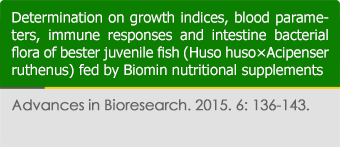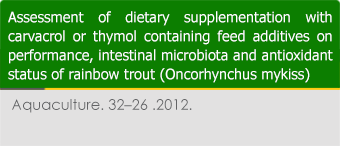Aquaculture
 |
 |
|
|
Fariborz Taghavi, Mehrdad Nasri Tajan, Abbas Ali Zamini This study is evaluated the effects of Biomin P.E.P supplement on growth indices, blood and immune factors, and intestine bacterial flora of Bester juvenile fish. The survey is conducted on Bester juvenile sturgeons in fisheries laboratory located in Islamic Azad University Science and Research of Guilan Branch in the fall of 1392. The completely random scheme of the research includes 4 treatments each of which has 3 repetitions. The supplement was added to the basal diet on 4 levels of 0, 1, 1/5, and 2 g / kg.72 of 45-g Bester fish were fed for 60 days based on 5 percent of the body weight in 12 tanks (100-liter) that 6 fish in each tank. At the end of the farming period some of the growth indices, blood and immune factors, and intestine bacterial flora were compared. So that in treatment 2 and in the level of 1/5 g/kg in some growth and nutrition factors such as average initial weight, total weight, total length, FCR, SGR, PBWI, BWI, ADG, at the end of the period, a significant difference was observed between treatment and control (P<0.05). But in the factors like Average initial length and Condition Factor (K), there was no statistically significant differences between treatment and control at the end of the period (P>0.05). Evaluation of blood factors indicated that the rate of red blood cells (RBC), white blood cell(WBC), hemoglobin (Hb), hematocrit (HCT), neutrophils, has decreased by increasing amounts of Biomin P.E.P compared to the control, and showed significant statistically difference (P<0.05). In evaluation of biochemical and immune factors, the amount of total immunoglobulin, albumin, total protein with different amounts of Biomin P.E.P had significant statistically difference (P<0.05).Therefore, this supplement affects the blood biochemical factors and can influence on their recovery. The total count of bacterial flora in the dilution TSA 10-1 showed that the levels of 1 and 1/5 g/kg has less amount compared to the control, and in MRS10-1 at the level of 1 g/kg LAB bacteria were higher compared to control, and it can be said with reducing bacteria on TSA, LAB bacteria have been replaced. it is therefore suggested of 1/5 g Biomin Nutritional Supplement in the 1 kg diet.
|
I. Giannenas, El. Triantafillou, S. Stavrakakis, M. Margaroni c, S. Mavridis, T. Steiner, E. Karagouni The manipulation and control of fish health and production by natural substances has been identified as an important area for future developments in aquaculture. A study was conducted to investigate the effect of two phytogenic feed additives, one rich in carvacrol (CARV containing 12 g/kg carvacrol) and the other rich in thymol (THYM containing 6 g/kg thymol) on growth performance, gut microbiota and antioxidant status of rainbow trout (Oncorhynchus mykiss) under commercial farming conditions. Groups of 30 sub-adult trout (113.0 g ± 10.4) were randomly allocated into 3 different treatments with three replicates each. The control group was fed a basal diet, while the other two groups were fed diets supplemented with the two phytogenic diets at the level of 1 g/kg. The fish were fed to apparent satiation for a period of 8 weeks. Body weight, body length and feed intake were recorded weekly. The intestinal bacteria populations (total aerobes, total anaerobes, Lactobacilli spp., Enterobacter spp., coliforms, E. coli and Aeromonas spp.) were enumerated by conventional microbiological techniques using selective agar media. Antioxidant status of fish was assayed for levels of glutathione reductase, glutathione-S-transferase and malondialdehyde levels in fish fillet at day 0 and 5 after slaughter. Lysozyme, nitric oxide (NO), total complement concentrations and catalase activity were also evaluated in fish blood serum. Results showed that dietary phytogenic supplementation with both products improved (P < 0.05) feed efficiency compared to control diet, although, body weight gain was unaffected by phytogenic supplementation. Total anaerobe counts were lower in phytogenic fed fish for both products compared to control; and lactobacillus loads in THYM group compared to CARV and control; however, other bacteria loads were similar among dietary treatments. Both phytogenic inclusion decreased significantly (P < 0.05) malondialdehyde formation on day 5 of refrigerated storage compared to control fish. Activity of glutathione based enzymes at both time points were significantly high in both phytogenic supplemented groups compared to control (P < 0.05). Levels of lysozyme and total complement concentrations as well as catalase activity were higher in phytogenic supplemented groups, especially in CARV group compared to control. Thymol supplementation reduced NO serum levels significantly compared to control group. In conclusion, dietary phytogenic supplementation exerted a beneficial feed conversion effect and increased antioxidant protective capacities in the trout fillet at 5 days of refrigerated storage. It also modulated intestinal microbial communities disfavouring total anaerobes and affected some innate immunity parameters. |
 Digestarom P.E.P
Digestarom P.E.P